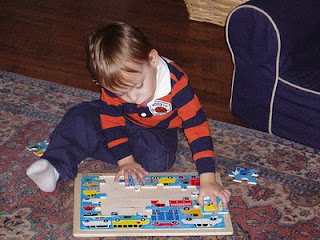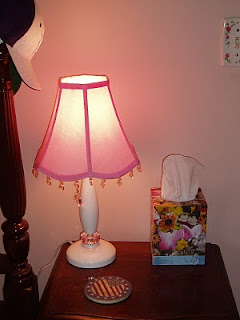I've been knocking this post around in my brain for a couple of weeks now and I can't decide how exactly to approach it... I have been thinking about the questions you've asked about good gifts for kids, how it is that Harper learned to read, preparing kids for school, good games, etc., etc. I feel as though the answers to those questions are really all wrapped up together.
I think we'll talk about reading in another post - although some of the things I think/recommend about gifts for kids and school readiness go along with the whole reading thing.
I feel like I should qualify this by saying that my kids have a lot of toys. A LOT. More than I think is ideal, and all of our toys don't fit into the categories of things I think are BEST for kids to play with. We have our share of Happy Meal cast offs and other assorted plastic junk that serves no discernible purpose.
Let's start with puzzles. I LOVE puzzles. And I think working puzzles are really good for our brains. I'm positive there is actual scientific evidence to support this somewhere... but please don't ask me where. This isn't a
research blog.
Puzzles teach logic and problem solving and spacial relations and, as they get more complicated, perseverance! We have lots of the simple wooden Melissa & Doug puzzles - letters, number, shapes, trucks, etc. These puzzles are great because they allow kids to have tactile experiences with numbers and letters and shapes, to think about which pieces will fit into which holes. These puzzles are the reason Harper knew what a trapezoid was when she was two.
Jigsaw puzzles offer a different level of challenge/learning. There is some strategy involved in completing them and a real sense of satisfaction when they are finished. Sure some people are more drawn to this kind of activity than others, but you can sit down to work a puzzle with someone and know pretty quickly whether they have done lots of puzzles or not. As kids get older I think there is something to be said for the delayed gratification factor of puzzles - you have to stick with them - and there is so little these days that requires extended attention from our kids. They are good for developing patience. And you can use them again and again and again.
(Er, maybe I should have broken this down into three posts, it is getting a little long...)
Now - games! I love to play games. Values of game playing include learning to take turns, think strategically, win and lose gracefully, follow rules, as well as reinforcing all kinds of math and reading skills, depending on what you play.
When I taught it was really clear who had played games at home and who hadn't. This probably sounds silly but I especially noticed when we had math problems that involved counting dice. Kids who'd played lots of games knew what number was shown without counting the dots. I'm pretty sure my brother learned the basics of math playing endless rounds of Monopoly.
I think it is kind of tricky to recommend specific games - my biggest recommendation is to play different types of games. Some games are all luck and little skill - like Candy Land or Chutes and Ladders. In fact, lots of preschool games are that way. And that's fine - that's where you work on the turn taking and rule following - learning the etiquette of game play. The point of those games is often reinforcing basic skills like color, number, and letter recognition. The nice thing about these games is that there is a comfort factor for lots of kids, so seven-year-olds might not mind revisiting them with a younger sibling. Harper's first game was My First Uno - which I highly recommend.
I've loved the "junior" versions of games for older kids. Usually around age four or five kids are ready to play the junior versions of games like Clue, Monopoly, and Yahtzee. We've had lots of fun playing those games with Harper. Other games we really like are Sequence Junior, Great States Junior, Mancala, Uno, Sorry, Memory, Zingo, Guess Who, and Connect Four. Harper is just now growing old enough for another level of game play and I love LOTS of the games in the Mindware catalog. If you don't know Mindware - check out their website: www.mindware.com Although I will say that many of their games are available at slightly more reasonable prices in stores or through Amazon.com.
As kids are older I have less patience for games that don't involve at least some thinking. Pretty Pretty Princess comes to mind. There's really no strategy to that game. Harper loves it because of the dress up factor, but I can only do one or two rounds of that at a time. I also shy away from noisy games - Hungry, Hungry Hippos comes to mind. And Don't Spill the Beans is a game we've not fallen in love with.
One other note about game playing - it is one thing to adjust a game for younger kids - like using fewer cards to make Memory easier, but I feel really strongly about playing games by the rules. Family and friends of mine will probably laugh at this but it drives me crazy to try to play a game and have someone say, "Oh that's not how we play it." But that is obviously a personal pet peeve, and not necessarily a comment about the value of playing games.
Finally, blocks. Actually, not just blocks, but open ended creative play toys. I get kind of itchy and annoyed about toys that are so specific they don't lend themselves to creative play. I'm a big fan of things to build with and things to play pretend with. Dolls/house play, dress up clothes, blocks, cardboard boxes, etc. It is good for kids to play with toys that don't direct the play for them! I do believe that some kids are more naturally creative/imaginative than others, but I also think it is possible to develop the ability to pretend and create with toys.
I'm having a hard time articulating what I mean, but the example of those talking Elmo dolls comes to mind. Sure they are funny and kids like them, but they often just do one type of thing. I'd rather by a regular stuffed Elmo and then at least the kids have to make it talk and sing themselves. And I'm not saying no one should have any of those type of toys, but it probably isn't great to have ALL of those type of toys. I also shy away from too many toys that are tied in to movies/tv shows. Some of those are fine, but I dislike the idea of everything my children play with being free advertising for Disney or Nickelodeon.
Gosh, hasn't this post been
so helpful? Snort.
One last thought - I've found it is important to have a balance of toys for children to play by themselves and for children to play with you.
Goodness - if you've read this far you deserve some kind of reward. I'll try to be a little more succinct tomorrow!








 Well, they probably aren't fighting in that picture but surely it was a momentary lapse into good behavior.
Well, they probably aren't fighting in that picture but surely it was a momentary lapse into good behavior. Harper's first shape was a Christmas tree, while Michael tackled a loose representation of an ornament.
Harper's first shape was a Christmas tree, while Michael tackled a loose representation of an ornament.




 He put about 1/4 of it together before getting frustrated and sort of growling and taking the pieces back out - it was kind of hilarious. I was truly surprised that he could even do that much of it. Eventually he brought it to me and we finished it together.
He put about 1/4 of it together before getting frustrated and sort of growling and taking the pieces back out - it was kind of hilarious. I was truly surprised that he could even do that much of it. Eventually he brought it to me and we finished it together. I know he can do it on his own only because we did it together so many times. He recognizes where in the puzzle the pieces belong. I know if I handed him a brand new 24 piece puzzle he wouldn't figure it out by himself. But I was still really excited for him.
I know he can do it on his own only because we did it together so many times. He recognizes where in the puzzle the pieces belong. I know if I handed him a brand new 24 piece puzzle he wouldn't figure it out by himself. But I was still really excited for him.  I lifted the "How to Eat a Turkey" picture from my sister-in-law's Facebook wall. Thanks Meg!
I lifted the "How to Eat a Turkey" picture from my sister-in-law's Facebook wall. Thanks Meg!









 In the end, it was fine, but this is not the first birthday where I've had to do the cake over. I find re-baking to be a discouraging experience. And I would like for the cake to be better than fine. Oh well. As long as the children want birthday cake I will keep trying. I have until March to come up with my next cake plan.
In the end, it was fine, but this is not the first birthday where I've had to do the cake over. I find re-baking to be a discouraging experience. And I would like for the cake to be better than fine. Oh well. As long as the children want birthday cake I will keep trying. I have until March to come up with my next cake plan.









 We had good food and time with friends and family and Harper received a heap of gifts that she loved. It was awesome, actually, she squealed with delight over everything. You can never be certain how that will go with little children, you know? And lots of her gifts were the kind that you enjoy and get lots of use out of over the long term, but maybe don't have a huge thrill-appeal for unwrapping. But she was so happy with everything and had no complaints about things she's been hoping for that weren't in her pile. It was heartwarming how happy she was.
We had good food and time with friends and family and Harper received a heap of gifts that she loved. It was awesome, actually, she squealed with delight over everything. You can never be certain how that will go with little children, you know? And lots of her gifts were the kind that you enjoy and get lots of use out of over the long term, but maybe don't have a huge thrill-appeal for unwrapping. But she was so happy with everything and had no complaints about things she's been hoping for that weren't in her pile. It was heartwarming how happy she was. 




 I tried to give it a more "finished" look by gluing a ribbon border around the bottom and adding a little button at the ribbon end. Once we've got her new bedroom items in place I'll have to take a picture of the tissue box on her nightstand with the lamp.
I tried to give it a more "finished" look by gluing a ribbon border around the bottom and adding a little button at the ribbon end. Once we've got her new bedroom items in place I'll have to take a picture of the tissue box on her nightstand with the lamp. 

